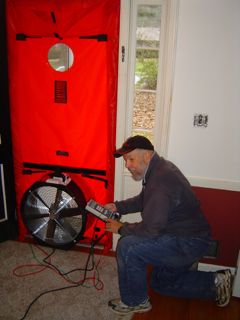The Only Two Certifications for Home Energy Auditors

Whether you’re a homeowner looking to get a home energy audit or you’re interested in getting trained to become a home energy auditor, you should know that there are only two organizations that offer what you’re looking for. One is RESNET, which stands for Residential Energy Services Network. The other is BPI, the Building Performance Institute.
Whether you’re a homeowner looking to get a home energy audit or you’re interested in getting trained to become a home energy auditor, you should know that there are only two organizations that offer what you’re looking for. One is RESNET, which stands for Residential Energy Services Network. The other is BPI, the Building Performance Institute.
If you’re new to this field, it can be difficult to discern that these are the only two that matter because there’s a plethora of organizations offering home energy audits and training outside of RESNET and BPI. See my recent article about home energy auditor certification scams for more info on that.
To get a home energy audit or training to become a certified home energy auditor, however, you’ll be dealing with other organizations, as RESNET and BPI are both non-profits that oversee their respective networks of independent businesses. They set the standards, accredit training organizations, and provide quality assurance, but they’re not the ones doing the actual training and home energy audits.
So, why are there two organizations, and what are the differences between them, you ask? Well, the short-but-not-quite-accurate answer you often hear is that BPI is for existing homes and RESNET is for new homes. There’s some truth in it because the RESNET protocol, the Home Energy Rating System (HERS), has been the only way to qualify ENERGY STAR new homes, and the BPI protocol has been a big part of weatherization programs that improve the existing homes of low income families.
One counter-example, however, is in the use of an Energy Efficient Mortgage (EEM) at the time of purchase or refinance to incorporate home energy efficiency improvements. The buyer must get a RESNET certified home energy rating to qualify for this type of mortgage. (An EEM used to improve existing homes is sometimes called an Energy Improvement Mortgage, or EIM.)
The real difference between the organizations is that the RESNET protocol includes energy modeling, and BPI’s protocol puts a lot of emphasis on combustion safety testing. RESNET last year beefed up their existing home standards, though, so I’d suggest it’s the more versatile certification. Both can be used for new homes or existing homes, however. Both include thorough inspections along with diagnostic or performance testing. Both will provide reports detailing the results of the home energy audit.
What they have most in common, though, is that both put heavy emphasis on looking at each house as a system. The many components that compose a house (insulation, framing, HVAC, moisture control…) often fight against each other, so a good home energy auditor with knowledge of building science often can diagnose problems and recommend solutions. Both RESNET and BPI teach that approach.
Another common tool is the use of diagnostic or performance testing. If you’re looking to get a home energy audit or become a home energy auditor, make sure that, at a minimum, Blower Door and duct leakage testing is part of the audit/training you pay for.
So, look for those two names – RESNET or BPI. In the field of home energy audits, they’re the only two that really matter. The Home Star Retrofit Rebate Program, which stalled in Congress last year, confirms this, as these are the only two certifications spelled out in the bill.
Looking to get certified? Sign up for our home energy rater class.
Looking to get a home energy audit? See our list of certified home energy raters.
This Post Has 2 Comments
Comments are closed.

I have been a green broker
I have been a green broker for 10 years now. Just want to let you know that EEM have been around for a long time now. They are virtually impossible to use. Believe me I have tried for both my listings and buyers. I use the FHA 203k loan now.
Kriapdx realtor: Yes, EEMs
Kriapdx realtor: Yes, EEMs are difficult, mainly because a lot of lenders either don’t know about them or don’t want to bother learning the details and making them work. We do have raters in our network, however, who are helping homebuyers qualify for EEMs, so they’re certainly not impossible.
You’re also right about 203k loans being very useful, and in fact, you can combine an EEM and a 203k to get $40k to $50k to do improvements on a home. Contact me if you’d like to know more, either about EEMs or EEM/203k combos.